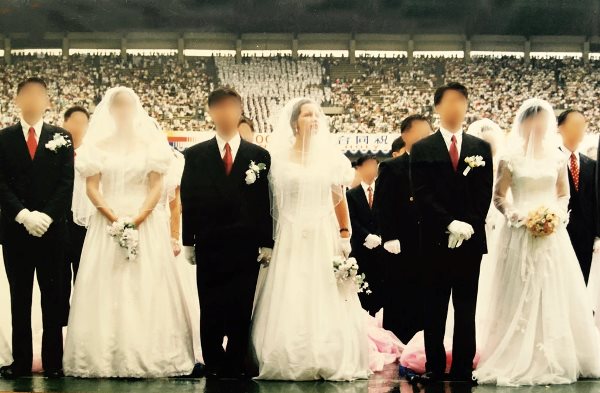
This intimate documentary centers on writer-director Cara Jones’s coming to terms with being raised in the Unification Church for nearly half of her life. Its members became notoriously known as Moonies, named after the group’s South Korean founder, Reverend Sun Myung Moon, who rose to prominence in the United States during the 1970s. The film cuts between Moon’s ascending popularity, which had to do with his vision of a world without racial or religious strife at a time when America was recovering from Watergate and the Vietnam War, and footage of Jones and her brothers growing up believing themselves to be chosen.
The Unification Church became a source of nationwide paranoia for its reputation as a cult, but for Jones, as a child, there was never any distinction between it and her own family. Her father, Farley, served as the president of the church, and the Joneses routinely shot home movies to share with church members back in South Korea. The film benefits from this treasure trove of highly personal footage, by which we witness the family’s devotion, especially young Cara’s.
As she came of age, Jones began to especially look forward to her “blessing,” or arranged marriage, to another church member. Reverend Moon decided such unions, and through video taken of actual matching events, we see the almost casual way in which he paired up his followers. But despite the promise of his divine insight, Cara had doubts about whether she had been matched to a suitable partner, although these concerns did not surface until her actual nuptials, which were alongside hundreds of other couples at a mass wedding.
Jones’s insider perspective gives the film many of its most unique moments. A filmmaker with a strictly outsider’s perspective might have looked askance at some of the Unification Church’s practices or beliefs, including the belief that Reverend Moon had been the messiah reborn on Earth. When Jones broaches the subject of the church’s theology, her tone is nonchalant and not ironic.
But this is not to say that the resulting film is pro-Unification Church. Jones recaps Moon’s very public fall from grace and doesn’t shy away from the harm his teachings caused the church’s youngest members. Numerous sons and daughters of followers, who were referred to as the “blessed children,” discuss how difficult it was not fitting the mold of what the church deemed “good”—straitlaced, obedient, and heterosexual. Some of the most affecting testimony comes from Cara’s brother and the film’s cinematographer, Bow Jones, who is still dealing with a lifetime’s worth of shame over his being gay.
Still, Jones tries not to be too judgmental toward her subjects. In a one-on-one conversation with her father, who has stuck by the church for decades, she lets him explain why he still supports it despite its flaws, never pushing back on anything he says. This leads to a heart-to-heart conversation that’s somewhat lacking in dramatic tension. The filmmakers’ empathy is better utilized on a trip to present-day Seoul to examine the current state of blessings, which have become more conventional compared to what Jones endured. The couples are happy and excited, but what gets underscored is the greater agency that the partners have in choosing mates.
Curiously, there are holes in the protagonists’ backstory that are never sufficiently filled in, such as why the Jones family was selected and subsequently elevated. Did it have anything to do with their being non-Korean or Farley’s work as an attorney? (It’s never explicitly stated whether he served in that capacity for the Unification Church.) In addition, Jones’s primary anxiety has to do with potentially marrying a person outside of her family’s faith and causing her parents to sever all ties with her. Yet throughout the various conversations with other former members, such ex-communications are never mentioned as ever happening. As such, the stakes for her never seem particularly high.
Yet for its serious attitude toward religious faith, not to mention a rare up-close-and-personal look at a once leading religious movement, Blessed Child is worth a look.
BlessedChild_Clip from Group Effort Films on Vimeo.






Leave A Comment